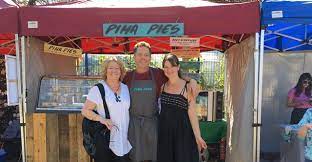
Can you tell us a bit about the background of Antipodes? Did you always have global ambitions?
Antipodes® is a Scientific Green Beauty™ company from New Zealand creating award-winning premium skincare from results-driven natural ingredients. Fifteen years ago, I was searching for natural skincare that offered the same benefits as conventional skincare – but using pure New Zealand ingredients that were independently and scientifically validated.
My background is in science, innovation, and natural health, so I understand how to bridge the gap between natural and prestige formulations. Our high-performing ingredients are sourced from New Zealand nature and our formulations are tested using in-vitro scientific investigations and clinical trials – which means our products are not only beautiful to use, but they genuinely work.
Since launching in 2006, we’ve remained committed to our green beauty ethos which means onshore production in New Zealand, sustainably sourced ingredients, recyclable packaging, and independent verification of our organic, vegan, and vegetarian products.
That unique approach has earned Antipodes® devotees and awards worldwide. I never doubted we would go global – and thanks to hard work and innovation, we now sell in over 40 markets on four continents. Our aim is to be the number one plant-powered scientific green beauty company in the world!
Why did you choose the US and Canada as the next location for expansion?
It’s always really important to check in with each of your export markets to see if everything is going as well as you expect. Our Canadian sales weren’t reaching our expectations for the market size and category growth, so we reviewed our operations there and decided to change distributor.
For the USA, we had been receiving a lot of market pull – enquiries, requests, media – so it was time to explore the options for market entry.
At a broader level, clean skincare is a growing beauty trend in the US and Canada, as the eco-conscious and style-savvy alike discover the benefits of green beauty and make the move to more sustainable choices. In short, consumers increasingly want to ‘walk the talk’. Antipodes occupies a special niche where our skincare is not only green, with certified vegan and organic products, but validated by science – and that’s something we look forward to bringing more of to these markets in the months ahead.
To what extent did Covid-19 impact your expansion into the US and Canada?
If anything, it sped it up! With everyone in New Zealand in lockdown during March, calls with markets to onboard our partners continued at a rapid pace. We had planned several onboarding trips to market, but instead we assembled virtual cross-functional teams and managed everything this way.
We found that our partners were all very willing to engage – and of course, they were in a similar situation themselves, so we were all in the same boat.
With our new distributor in Canada, we participated in the virtual tradeshow CHFA East, which was a new experience for our team. With a bit of creative thinking from the organisers, these events have been able to continue, which is wonderful to see. It’s (almost) business as usual.
During this time, we also took the opportunity to improve our ecommerce capability and relaunch our website as a key part of our launch into the USA. That was launched in June, thanks to the work of our team here in Wellington.
What does your team structure and operations look like given you can’t really travel at the moment?
We spend more time at the office, but the core of our operation hasn’t changed. We talk regularly to our distributors and retailers, whether it be by virtual or physical means.
Travel to market is key to maintaining relationships and gaining real insight into how the market functions. While we can’t do that everywhere at the moment, there are definitely ways around it – we’re relying on video calls and asking our partners to share photos and more detailed information about consumers and the retail environment. Thanks to modern technology we don’t have to compromise those key relationships and miss out on valuable intel.
Our New Zealand market is incredibly important to us, so we’ve been ensuring that the team gets out and about to our Kiwi retailers to understand how our local customers shop and get inspiration.
Beyond Covid-19, what has been the most challenging aspect of expanding Antipodes into a new market? What has been the most rewarding?
Over fifteen years, we’ve put processes in place to ensure we hit the ground running, smoothly. New markets require lots of research, involving conversations at many levels with potential business partners, in-market expertise (e.g. NZTE), retailers, beauty buyers, media, etc, ideally including a market visit. It’s always a really exciting time which requires lots of preparation, so the biggest challenge for us is remaining patient while we work through that preparation!
The second challenge is keeping the ball rolling after launch, ensuring that we work hard with our partners to continue to build brand awareness and sales. Every market is unique, but we’ve been in business since 2006, and so have been able to refine and perfect our roadmap over time. Our cross-functional teams mean we’re able to pivot onto new projects or problems when they arise, without roadblocks.
Most rewarding is the feedback we get from consumers all around the world who have discovered our products and fallen in love with them! Some of the stories are really moving, and we’re thrilled that our products have made such a difference to the confidence of so many people globally.
What has your experience with Kea Connect been like?
Any resource that is designed to foster connections between Kiwis and our vibrant business community is going to get a huge tick from us. In any business, building networks is so important. We’re relatively new to the Kea community, but we’re thrilled that Kiwis around the world are willing to help New Zealand businesses in this way. We also work closely with NZTE in many of our overseas markets and their support has been critical to our success.
What advice would you give to businesses looking to expand into a new market during this time?
Ensure you do your research. Find out as much as you can about the market in the months prior to launch, and who your local competitors and advocates are. Visiting the market is key if you can! Take lots of photos of where and how your products/services are likely to be relevant, talk to potential customers, end-users, and PR companies, and ask lots of questions. Your goal should be to gain not only a deep understanding of the market as it currently stands, but a birds-eye view of where it’s heading.
HOW KEA CAN HELP YOUR BUSINESS GROW
Kea Connect
Kea Connect is a free service that will help your business grow offshore. We connect you personally with regional, sector-specific experts and peers.
Resources
Kea is here to help New Zealand businesses grow offshore. Be inspired and hear advice from businesses who have created their export path.
Jobs Portal
Looking for the right talent for your team? Reach our global Kiwi community through the Kea international job portal.

 MENU
MENU










